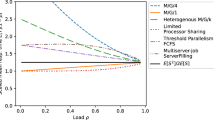Abstract
In this paper, we investigate the performance of two implementable test scheduling schemes for a multi-access communication channel whose components are subject to failure or malfunction. We relate the reliability of the system design, as reflected by system failure rate parameters, and the frequency at which the system (or nodal subsystem) is tested for failure detection, to the underlying key message delay and throughput performance. We derive queue-size distribution results for a discreteGeom (X)/D/1 system, representing the operation of the multi-access channel, or of a network node operating as a communications or queueing processor, which is maintained by a periodic or near periodic test scheduling scheme. Explicit formulas are presented for the system behavior as exhibited by the generating functions of the system queue-size distributions. The mean message delay is then calculated. The mean delay (or mean system size/workload performance index) can then be optimized by selecting the proper scheme parameters, under specified system (and component) failure conditions, noting that performing a test at too high a rate leads to inefficient system bandwidth utilization, while if tests are not carried out often enough, excessive message (or task) retransmissions and delays ensue.
Similar content being viewed by others
References
F. Baccelli, Analysis of a service facility with periodic checkpointing, Acta Informatica 15, 67 (1981) 67–81.
H.O. Burton and D.D. Sullivan, Errors and error control,Proc. IEEE, Special Issue on Computer Communication, vol. 60 (1972) pp. 1293–1301.
K.M. Chandy, A survey of analytic models of rollback recovery strategies, Comput. 8 (5) (1975) 40–47.
K.M. Chandy, J.C. Browne, C.W. Dissly and W.R. Uhrig, Analytical models for rollback recovery strategies in data base systems, IEEE Trans. Software Eng. 1 (1975) 100–110.
A.G. Gatfield, Error control on satellite channels using ARQ techniques, COMSAT Tech. Rev. 6 (1976) 179–188.
E. Gelenbe, On rollback recovery with multiple checkpoints,Proc. 2nd Int. Symp. of Software Engineering, IEEE, San Francisco (1976) pp. 251–255.
E. Gelenbe, On the optimum checkpoint interval, J. ACM 26 (1979) 259–270.
E. Gelenbe and D. Derochette, Performance of rollback recovery systems under intermittent failures, Commun. ACM 21 (6) (1978) 493–499.
J. O'Rourk and J. Zatz, Surveillance maintenance operations strategy for ISDN basic access lines,Proc. IEEE Network Operations and Management Symp. (NOMS'88), New Orleans, LA, Session 15 (Feb. 1988).
B. Saeki and I. Rubin, An analysis of a TDMA channel using stop-and-wait, block, and select-and-repeat ARQ error control, IEEE Trans. Commun. COM-30 (1982) 1152–1173.
I. Rubin and Z. Zhang, Message delay analysis for TDMA scheme using contiguous-slot assignments,ICC'88, Philadelphia (June, 1988) Sec. 12–1.
L. Takács,Introduction to the Theory of Queues (Oxford University Press, 1962).
D. Towsley, The waiting time distribution for statistical multiplexers with ARQ retransmission schemes,Proc. Int. Conf. Communications (1978) sec. 3.6.1–3.6.4.
D. Towsley and J.K. Wolf, On the statistical analysis of concentrators with ARQ retransmission schemes,Proc. 15th Allerton Conf. (1977) pp. 709–717.
I.S. Mikadze, A queueing system with an unreliable server and periodic checking, Cybernetics 24 (1) (1988) 68–75.
R.E. Barlow, L.C. Hunter and F. Proschan, Optimal checking procedures, J. SIAM 14 (4) (1963) 1078–1095.
D. Brender, A surveillance model for recurrent events, IBM Research Report, RC-837 (1962).
H. Luss, An inspection policy model for production facilities, Management Sci. 29 (9) (1983) 1102–1109.
Author information
Authors and Affiliations
Rights and permissions
About this article
Cite this article
Rubin, I., Zhang, Z. Performance analysis of test scheduling schemes for a multi-access communications network. Queueing Syst 7, 307–324 (1990). https://doi.org/10.1007/BF01154548
Received:
Revised:
Issue Date:
DOI: https://doi.org/10.1007/BF01154548




